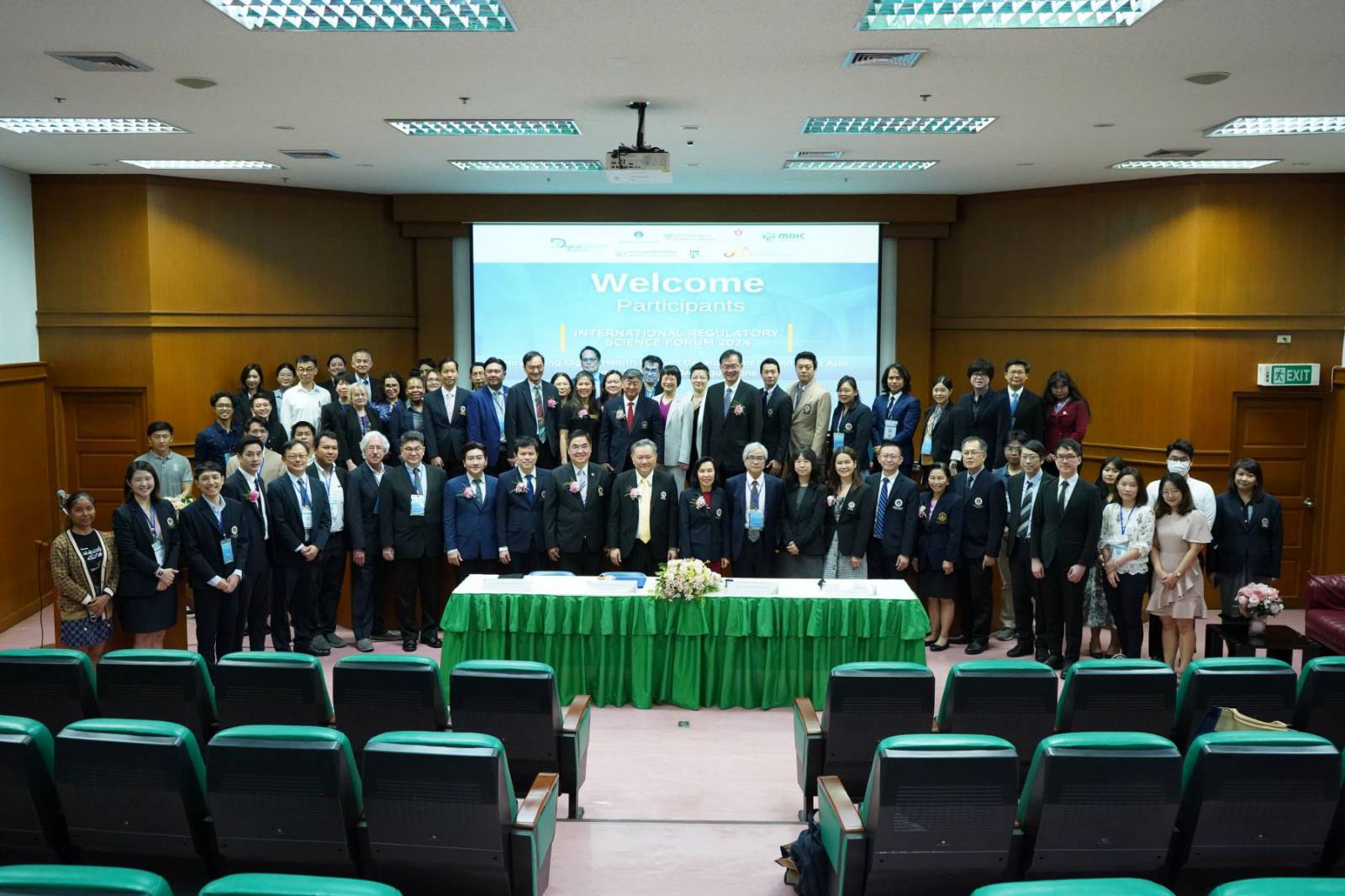| 637 Views 12 March 2024 |
On March 12, 2024, Mahidol University (MU) by its Faculty of Pharmacy and Faculty of Engineering jointly organized the International Regulatory Science Forum 2024: Navigating Digital Health Product Development in Southeast Asia amid Evolving FDA Regulations". This International Forum was arranged in collaboration with the global partners including 1) the University of Southern California's Department of Regulatory and Quality Sciences (USC), USA, 2) National Cheng Kung University (NCKU), Taiwan, and 3) the Medical Device Control Division, Thailand's Food and Drug Administration. It was also under the support from the Reinventing University: Drug Discovery & Development, under Thailand's Ministry of Higher Education, Science, Research and Innovation.
Having been held at MU's Faculty of Pharmacy, the rationale and objectives of the Forum was reported by Prof. Dr. Leena Suntornsuk, Chair of the Organizing Committee of the event. Its opening session was presided over by Mahidol University's President, Prof. Banchong Mahaisavariya, M.D., who kindly delivered an opening speech to the Forum's participants. The welcoming speeches were also addressed by 1) Prof. Hong-Chen Chen, NCKU's Executive Vice President, 2) Ms. Hsiu- Mei Hsueh, Deputy Representative of Taipei Economic and Cultural Office, Thailand, and 3) Assoc. Prof. Dr. Eunjoo Huisung Pacifici, Chair of the Department of Regulatory and Quality Sciences, USC. The opening ceremony was also attended by Assoc. Prof. Surakit Nathisuwan, the Dean of Mahidol University's Faculty of Pharmacy, along with Clinical Prof. Dr. Sirichai Kiattavorncharoen, the Dean of Mahidol University's Faculty of Dentistry, Assoc. Prof. Dr. Prasit Suwannalert, the Dean of Mahidol University's Faculty of Science, and Assoc. Prof. Dr. Thanapat Wanichanon, the Dean of Mahidol University's Faculty of Engineering.
Briefly, this International Forum was arranged for four consecutive days from March 12-15, 2024. There were several renowned speakers from MU, USC, NCKU along with their global partners from private sectors actively joined and shared expertise and insights to the Forum's attendees. The first three days included series of academic lectures that provided comprehensive and invaluable insights into digital health device development and market trends in Thailand and Southeast Asia as well as the current FDA regulations for digital health devices in the United States. Additionally, the invited speakers hosted six practical workshops focusing on cutting-edge products, including Software as a Medical Device, Mobile Medical Apps, and Artificial Intelligence/Machine Learning-enabled medical devices. These sessions were thoughtfully designed to enrich attendees' regulatory knowledge and sparked innovative ideas for practical regulatory strategies, benefiting both the local medical device industry and the international community.
Moreover, on the last day of this international event, the site visit at MU's Faculty of Engineering, particularly at the Department of Biomedical Engineering's laboratories, was also held to serve as a dynamic complement to the meeting, offering its participants a tangible connection to the real-world impact of innovative solutions and robust medical device manufacturing. These immersive experiences not only enriched the overall conference experiences, but also inspired participants to ignite and accelerate progress in these state-of-the-art technologies locally, all while aligning with the overarching objective of reducing healthcare costs in Thailand.
This international conference was determined 1) to cultivate global interactions among regulatory agencies, the industry, and regulatory affairs within Thailand and beyond, 2) to promote engagement and international cooperation and collaboration in the development of medical devices and the convergence of regulatory standards, and 3) to strengthen an international Collaboration between with MU's and USC's Regulatory Science Programs as well as the MU's Biomedical Engineering Program. This international conference would also unite three esteemed universities across the globe and four renowned programs specializing in biomedical engineering and regulatory science. Together, they converged at Mahidol University, solidifying its position as the forefront of digital health product innovation in Thailand.
In addition, this International Regulatory Science Forum focused on healthcare devices that were currently undergoing active development worldwide. The international and professional expertise shared during the workshop would specifically address cutting-edge products such as Software as a Medical Device (SaMD), Mobile Medical Apps (MMAs), and Artificial Intelligence/Machine Learning-enabled (AI/ML-enabled) medical devices. Furthermore, this event was set to play a crucial role as a platform for the convergence of regulatory authorities, industry experts, academic researchers, and regulatory educators. They would convene at Mahidol University to collectively evaluate the dynamic landscape of digital health technology development in Thailand and Southeast Asia and the current regulatory environment in this region and the United States. This engagement would also foster dialogue between government sectors, private sectors, and academia. The inclusion of the industry sector would contribute to the creation of a comprehensive ecosystem for the development of medical devices in Thailand.

